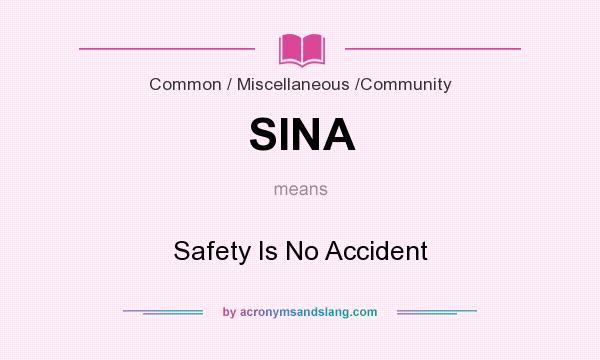What does SINA mean?
SINA means Safety Is No Accident
This acronym/slang usually belongs to Common / Miscellaneous / Community category.
Particularly in Construction Abbreviations
Particularly in Construction Abbreviations
What is the abbreviation for Safety Is No Accident?
Safety Is No Accident can be abbreviated as SINA

|
|
Most popular questions people look for before coming to this page
| Q: A: |
What does SINA stand for? SINA stands for "Safety Is No Accident". |
| Q: A: |
How to abbreviate "Safety Is No Accident"? "Safety Is No Accident" can be abbreviated as SINA. |
| Q: A: |
What is the meaning of SINA abbreviation? The meaning of SINA abbreviation is "Safety Is No Accident". |
| Q: A: |
What is SINA abbreviation? One of the definitions of SINA is "Safety Is No Accident". |
| Q: A: |
What does SINA mean? SINA as abbreviation means "Safety Is No Accident". |
| Q: A: |
What is shorthand of Safety Is No Accident? The most common shorthand of "Safety Is No Accident" is SINA. |
Abbreviations or Slang with similar meaning
- BINO - Bandwidth Is No Object
- SAAPP - Safety Assessment and Accident Prevention Plan
- TAIN - The Answer Is No
- TINFM - There Is No Freaking Manual
- TINK5C - There Is No Kuro5hin Cabal
- TINLC - There Is No Lumber Cartel
- TINSFOS - There is No Substitute for Span
- TINSK - There Is No Secret Kabal
- TINSTAAFL - There Is No Such Thing As A Free Lunch
- TINSTAAPP - There Is No Such Thing As A Pitching Prospect
- TINSTAFL - There Is No Such Thing As Free Lunch
- YIND - Yours Is No Disgrace
- DINO - Distance Is No Object
- ISLAR - Industrial Safety Lost Time Accident Rate
- MINO - Money Is No Object
- SAAP - Safety Assessment and Accident Prevention
- SNAP - Safety Network for Accident Prevention
- bait and switch. - An illegal sales tactic in which a consumer is lured by a low price only to be told that the "special offer" is no longer available and steered to a higher priced product.
- service compris. - Fr. Literally, "service included," that is, there is no need for an additional tip.
- POG - Pronounced “pogue.” Usually referred to someone that is a “shammer,” or someone that is no good. Varies in usage. Originally used mainly by infantry personnel, referred to ‘people other than